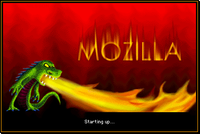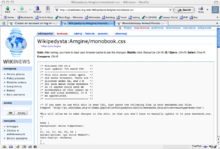- Mozilla
-
Mozilla is a term used in a number of ways in relation to the Mozilla.org project and the Mozilla Foundation, their defunct commercial predecessor Netscape Communications Corporation, and their related application software.
The term Mozilla is originally used for three distinct entities:
- The codename for the defunct Netscape Navigator software project
- The official, public, original name of the Mozilla Application Suite, later renamed SeaMonkey
- The mascot of Netscape, a cartoon reptile inspired by Godzilla
These and various other related uses of the term Mozilla are discussed below in the order when they were first used.
Contents
Main article: Netscape NavigatorHistorically, Mozilla had been used internally as a codename for the Netscape Navigator web browser from its beginning. Jamie Zawinski came up with the name during a meeting while working at the company.[1] The name was created as a portmanteau of the words "Mosaic killer",[2] hinting that Netscape would be the end to the (then only) competitor browser, Mosaic. The logo was a reference to the name of the fictional monster Godzilla.
Mascot of Netscape
Main article: Mozilla (mascot) An early Mozilla mascot
An early Mozilla mascot
 Startup screen of the Mozilla Application Suite for Mac OS 9 featuring the Mozilla mascot
Startup screen of the Mozilla Application Suite for Mac OS 9 featuring the Mozilla mascot
Mozilla was the mascot of the now-disbanded Netscape Communications Corporation, formerly called Mosaic Communications Corporation. Initially, the mascot took various forms, including that of a helmeted astronaut or "spaceman", but the eventual choice was a Godzilla-like lizard thought to go well with the name. It was designed by Dave Titus in 1994.
Mozilla was featured prominently on Netscape's website in the company's early years. However, the need to project a more "professional" image (especially towards corporate clients) led to it being removed. Mozilla continued to be used inside Netscape, though, often featured on T-shirts given to staff or on artwork adorning the walls of the Netscape campus in Mountain View. The color of the Mozilla lizard changed from its original green to a red version of the monster after the source code of the Netscape browser was released.[3]
When Netscape acquired the website directory NewHoo in 1998, they re-branded it the Open Directory Project with the nickname "dmoz" (Directory of Mozilla) due to its similarity to the Mozilla project. An image of Mozilla was placed on every page of the site, which remains the case today. Netscape Communications continued using the image of the red Mozilla in its iconography [4] in the Mozilla.org project web site.
Part of the "user agent string" of many browsers
Main article: User agent stringWhen users visit a website (via a user agent such as a web browser), a text string is generally sent to identify the user agent to the web server. It is known as the "user agent string". The Netscape web browser identified itself as "Mozilla/<version>" followed by some information about the operating system it was running on.
Because the Netscape browser initially implemented many features not available in other browsers and quickly came to dominate the market, a number of web sites were designed to work, or work fully, only when they detected an appropriate version of Mozilla in the user agent string. Thus, competing browsers began to emulate ("cloak" or "spoof") this string in order to also work with those sites. The earliest example of this is Internet Explorer's use of a user agent string beginning "Mozilla/<version> (compatible; MSIE <version>...", in order to receive content intended for Netscape, its main rival at the time of its development. This format of user agent string has since been copied by other user agents, and persisted even after Internet Explorer came to dominate the browser market.
See also: Browser warsMozilla project
Mozilla Foundation
Main article: Mozilla Foundation The Mozilla Foundation logo
The Mozilla Foundation logo
"Mozilla" is sometimes used to refer to the free and open source software project that was founded in order to create the next-generation Internet suite for Netscape. The Mozilla Organization was founded in 1998 to create a new suite. On 15 July 2003, the organization was formally registered as a non-profit organization, and became Mozilla Foundation. The foundation now creates and maintains the Mozilla Firefox browser and Mozilla Thunderbird email application, among other software. The Mozilla trademark is held by the Mozilla Foundation as of 2006.
Mozilla Corporation
Main article: Mozilla CorporationOn 3 August 2005, the Mozilla Foundation announced the creation of Mozilla Corporation, a wholly owned for-profit taxable subsidiary of Mozilla Foundation, that primarily focuses on delivering Firefox to end users. It also oversees marketing and sponsorship of the products.
Mozilla Messaging
Main article: Mozilla MessagingOn February 19, 2008, Mozilla Messaging was announced, which like Mozilla Corporation is a for-profit subsidiary of the Mozilla Foundation. Its focus will be on Thunderbird and possibly developing software related to other Internet communication media.
Mozilla Application Suite
Main article: Mozilla Application Suite Mozilla 1.7 showing a Wikinews page
Mozilla 1.7 showing a Wikinews page
Netscape announced on January 22, 1998 that it would be relicensing its source code for future development.[5] In March 1998, Netscape released most of the code for its popular Netscape Communicator Internet suite under a free software/open source license, the Netscape Public License. The application developed from this was named Mozilla, as this was the codename of the original Netscape Navigator. After a series of lengthy pre-1.0 cycles, Mozilla 1.0 was released on June 5, 2002.
Netscape programmers continued contributing to the open source Mozilla project and using that source code to create Netscape-branded releases which included the addition of proprietary software, more notably a commercial spellchecker and a lightweight version of the AIM and ICQ instant messenger integrated with the browser. All of these browsers showed the copyright notice and acknowledgements page when the user entered "About:mozilla" in the URL bar.
The suite was well known as the free/open source base of the Netscape suite (versions 6 and 7), and its underlying code (most notably the Gecko layout engine) became the base of many standalone applications, including the Mozilla Foundation's flagship products Firefox and Thunderbird. To distinguish the suite from the standalone products, the suite is often marketed as "Mozilla Application Suite", or the more concise "Mozilla Suite".
The Mozilla Foundation no longer maintains the suite, so that their developers can focus on Firefox and Thunderbird. The suite has been handed over to the SeaMonkey Council which has continued development with SeaMonkey, an Internet suite developed by the Mozilla community that is based on the source code of the Mozilla Suite, and supersedes it.
Collective name for Mozilla-based browsers
For simplicity, the term Mozilla is often used to refer to all Mozilla-based browsers. For example, when it is said that a website is usable by Mozilla browsers, it means that it is usable by Mozilla Suite/SeaMonkey, Firefox, Camino, Netscape 6, etc. In some older Internet statistics programs, the term "Netscape 5.x" is incorrectly used to refer to these browsers because the user agent string starts with Mozilla/5.0.
Application framework
Main article: Mozilla application frameworkThe term Mozilla is also used to refer to the Mozilla application framework, a cross-platform application framework for writing applications that can run on multiple operating systems. It consists most notably of the Gecko layout engine, but also the XUL user-interface toolkit, the Necko networking library, and other components. This is the core that all Mozilla-based browsers and applications are built from.
Codebase
Source code for Mozilla software projects such as Firefox, Thunderbird, and XULRunner are managed collectively in a single Mercurial repository. This large codebase is referred to as the Mozilla codebase, the Mozilla source code, or just Mozilla. Before Gecko 1.9 had branched, CVS was used.[6]
The Mozilla codebase was originally released under the Netscape Public License. The license was updated to version 1.1 and renamed the Mozilla Public License (MPL). The Free Software Foundation and others noted that a GPL-licensed module and an MPL-license module cannot be legally linked, and they recommend that developers not use the MPL for this reason.[7] To address this concern, the Mozilla Foundation relicensed great parts of the codebase in 2003 under the GNU General Public License and GNU Lesser General Public License as well as the Mozilla Public License.[8]
Software
- Bugzilla – a bug tracking tool
- Camino – a web browser for Mac
- Minimo
- Mozilla Skywriter – formerly known as Bespin
- Mozilla Firefox – a web browser
- Mozilla Firefox for mobile
- Mozilla Geode
- Mozilla Songbird
- Mozilla Thunderbird – a mail client
- Firefox Sync – formerly known as Mozilla Weave
- SeaMonkey
- Tinderbox
See also
- The Book of Mozilla
- Timeline of web browsers
- -zilla (suffix)
References
- ^ "Jwz.org". Jwz.org. http://www.jwz.org/gruntle/nscpdorm.html. Retrieved 2010-11-09.
- ^ "History of the user-agent string". Nczonline.net. http://www.nczonline.net/blog/2010/01/12/history-of-the-user-agent-string/. Retrieved 2010-11-09.
- ^ "Dilanchian Lawyers and Consultants". http://www.dilanchian.com.au/images/stories/mozilla_logo_lizard.gif. Retrieved 2010-11-09.
- ^ http://www.dilanchian.com.au/images/stories/mozilla_logo_lizard.gif
- ^ "Netscape Announces Plans To Make Next-Generation Communicator Source Code Available Free On The Net". Netscape. 1998-01-22. http://wp.netscape.com/newsref/pr/newsrelease558.html.
- ^ Posted by preed on April 12, 2007 11:55 AM (2007-04-12). "preed's blah-blah-blahg: Version Control System Shootout Redux Redux". Weblogs.mozillazine.org. http://weblogs.mozillazine.org/preed/2007/04/version_control_system_shootou_1.html. Retrieved 2010-11-09.
- ^ "GNU comments on MPL". Gnu.org. http://www.gnu.org/licenses/license-list.html#MPL. Retrieved 2010-11-09.
- ^ Frank Hecker. "Mozilla Foundation MPL Relicensing FAQ". Mozilla.org. http://www.mozilla.org/MPL/relicensing-faq.html. Retrieved 2010-11-09.
External links
- Mozilla Organization
- Mozilla Corporation
- Official Mozilla Wiki.
- Mozilla Messaging
- Mozilla Europe Project
- Mozilla Mercurial Repository
Mozilla Project Mozilla LabsMozilla ResearchBoot 2 Gecko · RustCamino · Firefox (2 · 3 · 3.5 · 3.6 · 4 · 5 · 6 · 7 · 8 · 9 · 10 · 11 · 12 · Mobile) · SeaMonkey
more- Origin and lineage: Mozilla Application Suite · Netscape Navigator · Netscape Communicator · Netscape Communications · Beonex Communicator
- Forks: BurningDog · Flock · Gnuzilla · Iceape · IceCat · Icedove · Iceowl · Miro · Netscape 9 · Portable Edition · Songbird · Swiftfox · Swiftweasel · TenFourFox · XeroBank
- Framework: add-on · Gecko · Necko · XBL · XPCOM · XPConnect · XPInstall · XUL · XULRunner
- Componentry: Application Object Model · Composer · NSPR · NSS · Rhino · SpiderMonkey · Tamarin · Venkman
- Project: Personas, Snowl, Test Pilot — Chromatabs, Geode, Joey, Operator, The Coop
- Discontinued: Calendar Project · Grendel · Minimo
Organization FoundationFormer Mozilla Organization · Mozilla Foundation (Subsidiary: Mozilla Corporation · Mozilla Messaging · Mozilla Online)Official affiliateCommunity See also
Wikimedia Foundation. 2010.


